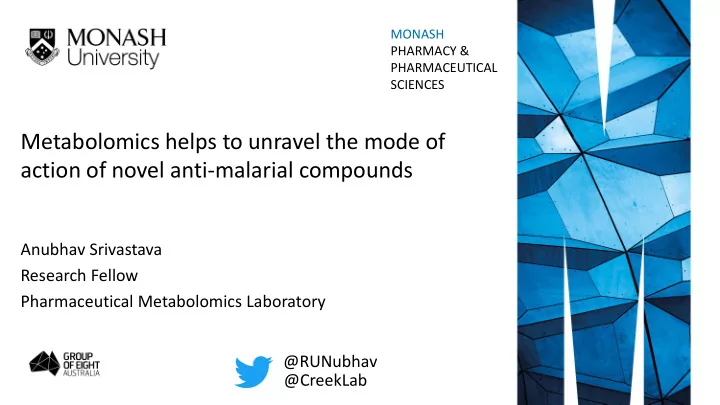

MONASH PHARMACY & PHARMACEUTICAL SCIENCES Metabolomics helps to unravel the mode of action of novel anti-malarial compounds Anubhav Srivastava Research Fellow Pharmaceutical Metabolomics Laboratory @RUNubhav @CreekLab
Malaria: we need new drugs High ACT failure rate (>10%) India >200 million cases of malaria and an 1 ACT China (Yunnan) 2 ACTs estimated 429000 Anopheles deaths in 2015 5 ACTs P. falciparum Mosquito (WHO 2016) Vietnam Myanmar Lao PDR • P. falciparum has developed resistance to the first line of malaria treatment, Artemisinin-based Combination Therapies (ACTs) in many Thailand countries in South-East Asia 1,2 • Resistance has also been reported from Africa 3 Cambodia • We need new anti-malarials to combat the on-going threat of anti- malarial drug-resistance WHO Status report on artemisinin and ACT resistance (April 2017) 1. Dondorp AM, et al. 2009 N Engl J Med; 361:455-467 2. Ashley EA, et al. 2014 N Engl J Med; 371:411-423 3. Feng Lu, et al. 2017 N Engl J Med; 376:991-993
Anti-parasitic drug discovery approaches Approach Success Rate Mode of Action Efficacy • Target-based • Combinations Known Poor screening/design • Resistance ? Screening Parasite death library METABOLOMICS Small molecules Phenotypic Unknown Known Better Screening
Drug Discovery Systems Pharmacology Genomics Transcriptomics Proteomics Metabolomics
Drug Discovery Systems Pharmacology Metabolomics Proteomics Transcriptomics Genomics
Metabolomics Methodology Drug Incubation/ Extraction -80°C LC-MS: HILIC-Orbitrap (Untargeted) High resolution Accurate HILIC chromatography mass MS (Zwitterionic) Data Analysis: IDEOM workflow
Using Metabolomics to study mode of drug action Drug
Novel anti-malarials Compounds used in this study - Potent activity - No known target http://opensourcemalaria.org Inactive
Compounds used in this study PfATP4 inhibitors ? ? MMV390482 MMV000073 MMV397264 Known anti-malarials Atovaquone Chloroquine Dihydroartemisinin
Unsupervised Hierarchical Clustering Results: Multivariate analysis P_397264:P_397264_4 P_S313:P_S313_2 P_000073:P_000073_2 P_000073:P_000073_4 P_000073:P_000073_1 P_000073:P_000073_3 P_S5:P_S5_2 P_S5:P_S5_4 P_397264:P_397264_2 P_S313:P_S313_4 P_DHA:P_DHA_3 P_DHA:P_DHA_4 P_DHA:P_DHA_1 P_DHA:P_DHA_2 P_S5:P_S5_1 P_S5:P_S5_3 P_390482:P_390482_2 P_390482:P_390482_4 P_390482:P_390482_1 P_390482:P_390482_3 P_S313:P_S313_1 P_397264:P_397264_3 P_397264:P_397264_1 P_S313:P_S313_3 P_CQ:P_CQ_3 P_CQ:P_CQ_4 P_CQ:P_CQ_1 P_CQ:P_CQ_2 P_S4:P_S4_3 P_S291:P_S291_2 P_S4:P_S4_4 P_S106:P_S106_1 P_S106:P_S106_3 P_S106:P_S106_2 P_S106:P_S106_4 P_S291:P_S291_1 P_DMSO:P_DMSO_4 P_S133:P_S133_4 P_S133:P_S133_2 P_DMSO:P_DMSO_2 P_DMSO:P_DMSO_3 P_DMSO:P_DMSO_1 P_S133:P_S133_1 P_S133:P_S133_3 P_S4:P_S4_1 P_S4:P_S4_2 P_S291:P_S291_3 P_S291:P_S291_4 P_S112:P_S112_2 P_S112:P_S112_4 NDF: No Discriminating P_S112:P_S112_1 P_S112:P_S112_3 P_S37:P_S37_1 Features P_S37:P_S37_3 P_ATV:P_ATV_3 P_ATV:P_ATV_4 P_S37:P_S37_2 P_S37:P_S37_4 P_ATV:P_ATV_1 P_ATV:P_ATV_2
Results: Multivariate analysis Heat map MMV PfATP4 Known OSM antimalarials inhibitors compounds 471 putative metabolites Peptides Nucleotides s Cofactors Classification Lipids Carbohydrates and energy b d s r metabolism Pathway i mapping Amino acid metabolism Fold change Unclassified 5 0.2 1
Novel anti-malarials Compounds used in this study - Potent activity - No known target http://opensourcemalaria.org Inactive
MoA of OSM-S-112 and OSM-S-37 Similar to Atovaquone Pyrimidine biosynthesis is affected in parasites treated with OSM-S-112 and OSM-S-37 OSM-S-37 >> OSM-S-112 DHODH DMSO control Dihydroorotate DHODH dehydrogenase Inhibition
Novel anti-malarials Compounds used in this study - Potent activity - No known target http://opensourcemalaria.org Inactive
MoA of OSM-S-106 and OSM-S-5 Unknown OSM-S-106 OSM-S-5 • Multivariate PfATP4 analysis inhibitors ATV (PCA) • No unique OSM-S-106 changes DHA DMSO OSM-S-5 CQ • MoA DHA requires further PfATP4 CQ inhibitors investigation ATV • e.g. enriched (>90%) DMSO parasite cultures
Novel anti-malarials Compounds used in this study - Potent activity - No known target http://opensourcemalaria.org Inactive
MoA of OSM-S-313 Similar to MMVPfATP4 inhibitors OSM-S-313 DMSO ATV Multivariate analysis (PCA) showed that CQ parasites treated with OSM-S-313 cluster DHA together with parasites treated with the MMV PfATP4 inhibitors OSM-S-313 PfATP4 inhibitors
MoA of OSM-S-313 Similar to MMVPfATP4 inhibitors Spent media Cell pellet
PfATP4 maintains Na + homeostasis in the malaria parasite Plasma Na + RBC NPPs PVM Parasite PfATP4 Adapted from: Spillman NJ, Kirk K. Int J Parasitol Drugs Drug Resist. 2015;5: 149–162
Disruption of Na + regulation: Potential mechanisms of parasite killing RBC Inhibition of metabolic enzymes PVM Parasite Cell lysis due to osmotic imbalance High Na + Inhibition of physiological processes dependent on Na + Adapted from: electrochemical gradient Spillman NJ, Kirk K. Int J Parasitol Drugs Drug Resist. 2015;5: 149–162
High Na + concentration can inhibit glycolysis Glucose P P Fructose-1-6-bi-P Glyceraldehyde-3-P P Glycerone-P P P Phosphoenolpyruvate Can be inhibited by high Na + Pyruvate AMP This can prevent re-phosphorylation of adenylates Utter M.F., J Biol Chem. 1950 Aug;185(2):499-517
Summary MMV397264 MMV390482 Glycolysis Pyrimidine synthesis Higher success Phenotypic Metabolomics Screens Unknown Unknown Known MoA
Acknowledgements Darren Creek Ghizal Siddiqui Carlo Giannangelo Katherine Ellis Anna Sexton Matthew Challis Amanda Peterson Tom Kralj Dovile Anderson Amanda De Paoli Matthew Todd @CreekLab Jeremy Burrows
Recommend
More recommend